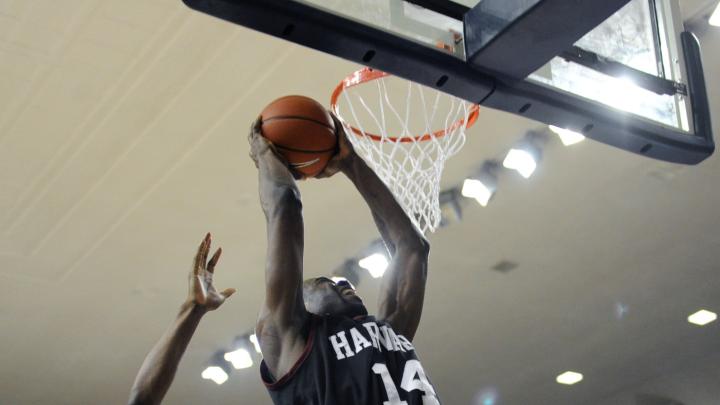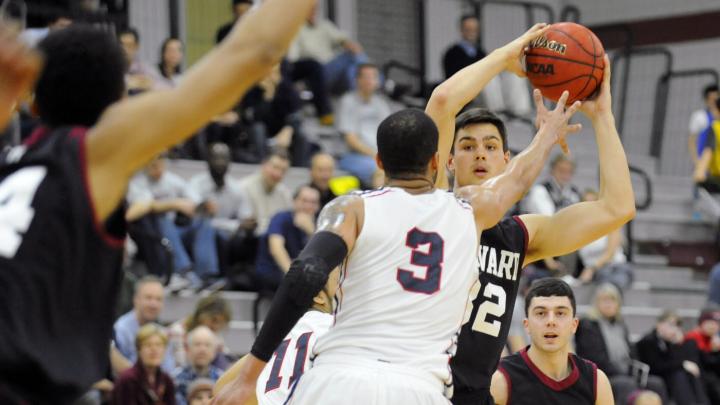Harvard Hardwood, the Harvard Magazine basketball report
Earlier this month, Evan Cummins ’16 and Patrick Steeves ’16, forwards on the Harvard men’s basketball team, gathered with other House members in the Lowell dining hall for a speech that was both familiar and strange. The orator, clad in a sports jacket and an open-collared white dress shirt, had dressed the way their head coach, Tommy Amaker, does for games. The speaker also shared many of Amaker’s aphorisms, such as “Failing to prepare is preparing to fail.” But Amaker was in the audience; the speaker was their teammate, Charlie Anastasi ’15.
In “The Voice Inside My Head,” delivered as part of the Lowell Speeches Project, Anastasi discussed what he had learned from Amaker during his journey from being the team’s last cut as a freshman to making the practice squad and eventually the varsity as a sophomore. Above all, he focused on a message Amaker had emphasized to last year’s squad that at first seemed “paradoxical.” “We are not interesting in winning championships,” Anastasi recalled Amaker saying. “We are trying to become a championship team.”
More than a year later, Anastasi parsed the quotation clearly. “We don’t judge ourselves based on the scoreboard, or simply making a team, or even hoisting a banner,” Anastasi said, his volume and pitch rising for emphasis. “We will instead build a culture of excellence that demands commitment to high standards and personal roles.”
This past weekend, Harvard looked more like a championship team than it has all year; and with some help from Columbia, the Crimson also moved substantially closer to winning a championship. Amaker’s squad demonstrated a champion’s commitment to teamwork in throttling Penn 69-46 on Friday and played similarly high-level defense to overcome a 12-point deficit and topple Princeton 63-55 on Saturday. Paired with Columbia’s upset of Yale in New Haven on Saturday, the home sweep gave the Crimson (19-5, 9-1) a one-game lead over the Bulldogs (19-8, 8-2) with just four regular season games left to play. A fifth straight championship banner is now well within reach.
 Harvard Hardwood
Harvard Hardwood
Sign up for Harvard Magazine’s basketball e-mail and follow the Crimson all season long! David L. Tannenwald ’08 will provide the latest news, game summaries, and insights as the Crimson chase another Ivy title and NCAA berth!
Pinning Penn
Another Amaker adage is “Guards get judged by their decisions. Posts get judged by their effort.”
With barely five seconds left in the first half and the Crimson leading 31-22, junior point guard Siyani Chambers made a poor decision: throwing a lob pass that the Quakers easily intercepted and converted for a layup at the buzzer to cut the Crimson’s lead to seven. The four-point swing gave the Quakers—whose leading scorer, Tony Hicks, had been suspended for the weekend—a tinge of momentum, and Amaker started chewing out Chambers en route to the locker room.
During the second half, the Crimson pulled away largely because the posts put forth outstanding effort. A case in point was Jonah Travis ’15, who entered the game with 13:44 remaining as Harvard nursed a six-point lead. In the next 75 seconds, he sank two free throws, scored a layup, and hauled in a defensive rebound. Crimson by 10. Assisting on Travis’s basket was fellow power forward Steve Moundou-Missi ’15, who then sank a jump shot, a layup, and a pair of free throws, pushing the lead to 17.
The stretch was significant not just because it put the game out of reach for Penn, but because it illuminated how the Crimson thrives when individual players actively accept their roles. Travis has been—and could still be—a starter, but in a move that Amaker characterized as “unselfish,” he has embraced his backup role of coming off the bench. Similarly, Moundou-Missi receives less coverage than his fellow co-captain, Chambers, and his classmate, Wesley Saunders, last year’s Ivy League Player of the Year, but he has quietly led the team in rebounds (6.8 per game) and is tied with Corbin Miller ’15 (’17) as the squad’s third-leading scorer.
With improved play from the front court, the entire offense has improved. Amaker has said repeatedly that on offense he wants the team to play “inside-out”: they should begin possessions by getting touches in the post or interior dribble penetration, with hopes of getting a layup or freeing a wing for an outside shot. Instead, for much of the season the squad had struggled to get the ball to posts near the basket. But on Saturday, with Travis and Moundou-Missi controlling the paint, opportunities opened up on the outside for Chambers, Miller, and Saunders, all of whom hit three-pointers or jump shots during the second-half run.
Against an admittedly weakened opponent, the Crimson offense looked as cohesive as it has all year. More important, after briefly appearing threatened, the Crimson put a weaker opponent away, as championship teams must do.
Closing the Back Door
Amaker has also said repeatedly that the team’s defense is its “calling card” and that the Ivy League is won (or lost) on Saturday nights.
This past Saturday, the Crimson faced a special challenge: defending the “Princeton Offense.” The system is predicated on backdoor cuts—a maneuver in which an offensive player takes several steps away from the basket before aggressively cutting in the opposite direction. If the defender is not extremely alert, the cutting player can receive a bounce pass from a teammate and score an easy layup.
In the first half of Friday’s game, the Crimson defense seemed flummoxed. The Tigers burnt Amaker’s squad on several backdoor cuts and made five of 10 three-point attempts. (Princeton recruits excellent shooters at every position so that they can space the floor.) The Tigers led by 12 points early and took a 37-29 advantage into intermission.
In the second half, the Crimson played aggressive, interdependent defense. On the perimeter, Chambers hassled Princeton’s ball handlers, complicating passes to cutting players. When a pass reached the interior, Harvard’s posts rapidly rotated. The increased pressure resulted in eight Crimson steals and just 18 Princeton points. It also contributed to an ill-advised pass that Chambers intercepted and laid in with just under three minutes left to give Harvard a lead it would not relinquish.
And Then There Were Four
The question becomes whether the Crimson will maintain an equally strong grip on its newfound perch atop the conference. Make no mistake, the team has a tough road ahead: next Friday, the players travel to Ithaca (the longest Ivy road trip), before driving through the night to face Columbia, a rival they only narrowly beat in Cambridge. The Crimson then returns home for a rematch with Yale before concluding the regular season against Brown, an opponent that took them to overtime.
Still, the squad can gain confidence from having swept consecutive four-game stretches, having coalesced around Amaker’s message, and, most important, having embraced the belief that they have yet to peak. According to Anastasi, the players and coaches have discussed how by this point in the season, teams often try merely to sustain their performance, whereas the Crimson is focused on continuing to improve. Chambers added that Amaker—now the Thomas G. Stemberg ’71 Family Endowed Coach for Harvard Men’s Basketball (see “Tidbits,” below)—has helped keep the squad fresh by varying their practice routines. What’s more, despite all their recent success, the team has not forgotten their early season loss to Holy Cross. As a result, they understand the importance of guarding against complacency and polishing their play.
Now they have four games in two weeks to complete that process. As they do, they will be hearing Amaker’s voice inside their heads: “Last part, strongest part.”
Tidbits
- At halftime on Saturday, Harvard Athletics held a ceremony to celebrate Thomas G. Stemberg ’71, M.B.A. ’73, a longtime supporter of Harvard basketball who recently made an undisclosed donation to endow the men’s basketball coaching position. The event, held in the presence of dozens of men’s basketball alumni at center court, featured remarks from President Drew Faust; Harvard athletic director Bob Scalise; former Harvard coach Frank McLaughlin; and Stemberg himself.
- The Harvard women’s basketball team lost to Pennsylvania 71-61 on Friday night and to still-undefeated Princeton 78-57 on Saturday. Senior Temi Fagbenle led the way against the Tigers with 18 points and 10 rebounds, her tenth double-double of the season. Next up for Harvard (10-14 overall, 3-7 Ivy), is a home stand against Cornell and Columbia.








